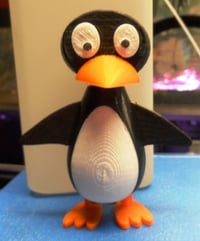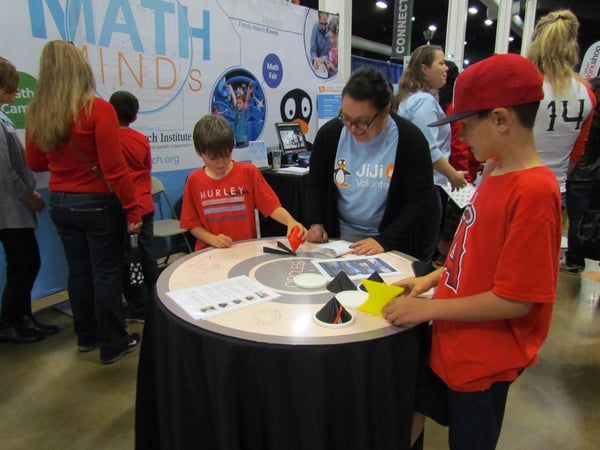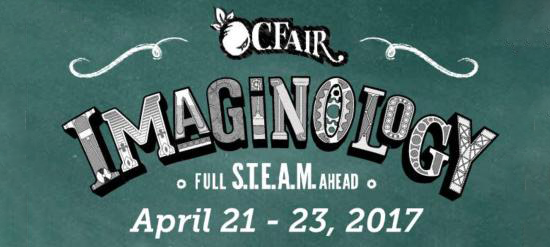
The challenges of getting students interested in STEM (science, technology, engineering, and math)/STEAM (including the arts) are well-documented and the implications for our economy are staggering. How can we as individuals help combat this and give students more opportunities to gain skills that will help them find success in their careers and lives?
One avenue that makes a big impact is when real people like you volunteer.
While professionals in the STEM fields are uniquely positioned to share their expertise with students by volunteering, anyone who is open to learning can volunteer and share the learning experience with students, regardless of their degree or career.
Here are the top reasons why these community members are willing to share their time to help get students interested and engaged in the STEM fields.
During the first 3D Printer Club at Middle Summit View Academy in Independence, KY, students researched, designed and improved their own 3D design. Community volunteers like John Richardson helped make the 12 week program possible by providing access to 3D printers as well as tutorials and guidance throughout the design process.
“Over the course of the club, we saw students begin to think in a visual way, developing spatial skills and problem-solving skills. The students who stuck it out with the program were girls, and we saw an increase in their confidence in STEM subjects,” John said.
John has over 30 years of experience in computer technology; everything from setting up and fixing computers to designing and printing his own 3D models. He is a regular volunteer for many of the STEM/STEAM festivals at schools in the local Kentucky and Ohio area, showcasing 3D printers and models.

John created 3D printed JiJi* fanart for students who achieved success in the ST Math program at White’s Tower Elementary in Independence, KY. He enjoys the reactions of students when they see the 3D printed objects and get curious about the possibilities of technology.
“When you give students access to technology, they have more opportunity to develop these skills –like thinking visually and increased adaptability– that can help them in their future careers.” – John Richardson
“There are so many challenges in education and getting students motivated. That, coupled with the fact that STEM is not easy, means we really need more opportunities to make STEM accessible for students,” said Dharna Patel, a Senior Supplier Analyst at Capital Group. Dharna has volunteered with non-profits School on Wheels and MIND Research Institute.
Dharna never thought she would become passionate about STEM/STEAM education, but she says the passion and dedication of employees at MIND is infectious, and she is able to get behind learning math through games, which allows students to learn and apply the math concepts in a fun way.

“Non-STEM professionals can still volunteer, even if you don’t consider yourself a ‘math person’, because what organizations like MIND are doing is sharing other ways to understand and access the math. When you open yourself up to the possibility that you can do math and learn, you can share that learning experience with the students and change their perceptions about math.” – Dharna Patel
When students’ eyes light up, Dharna knows they are making connections in math and science that will affect them long-term. “Giving back, even just for a day, can have a big impact,” she concludes.
“Math is critical no matter what you do as a career,” said Sara Garske, Assistant Vice President of Philanthropy Services at First Foundation, co-chair of the leadership council at MIND Research Institute and a volunteer at MIND for seven years.
Sara recalls that when she was in school, learning through textbooks felt counterintuitive and unrelated to the world around her. She sees the new teaching platforms, such as learning through technology and games, as a better way for kids to experience those “aha” moments of understanding, and to have fun with the material.
“Community events like the Math Fair reinforce to kids that math is everywhere, and that the math they learn in school will help them in their future career and passion. The more we can show students the purpose of math learning, the more opportunities they will have to succeed and find their own passion.” – Sara Garske
As a volunteer, Sara says she noticed herself and the other volunteers experiencing just as much fun and learning as the students!
Brad Morton, a college student studying computer science at University of California, Irvine, has a similar experience: “When you get out and volunteer to educate others, you end up educating yourself.”
MIND Research Institute will be at the OC Fair Imaginology in Orange County, Calif. this April 21-23. Sign up to volunteer at our booth and share your passion for STEAM.!

*JiJi and ST Math are registered trademarks of MIND Research Institute. All rights reserved.
This article was orginally posted on June 7, 2016 and has been updated with new volunteer opportunities.

Maria Cervantes is the Community Partnerships Director at MIND Research Institute. Find her on Twitter @magucervantes1.
Comment